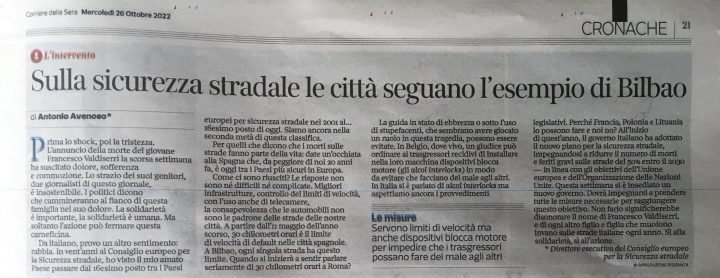In Italy road safety is on the front page, but sympathy from politicians is not enough. It’s time for action.
Last week the 18-year-old son of two journalists of the Corriere della Sera newspaper was killed by a car driver while walking along the pavement on a street in Rome. In an opinion article in that newspaper, ETSC’s Executive Director Antonio Avenoso makes a passionate call to action, citing progress in Spain as an example for Italy to follow.
First the shock. Then the sadness. Pain, grief and emotion were on display last week with the announcement of the death of young Francesco Valdiserri. The devastation of his parents, two journalists of this newspaper, is unbearable to witness. Politicians say they will walk with this family in their pain. Sympathy is kindness. Sympathy is human. But only action can stop this devastation.
As an Italian, I feel another emotion: anger. In twenty years at the European Transport Safety Council, I have watched my beloved home country go from 16th place among European countries for road safety in 2001 to…16th place today. We are still in the bottom half of this table.
For those that say road deaths are part of life: take a look at Spain, which was worse than us 20 years ago, and is now among the safer countries in Europe.
How did they do this? The answers are not difficult or complicated. Better infrastructure. Enforcement of speed limits, including with cameras. A recognition that cars do not own the roads in our cities. Since 11 May last year, 30 km/h has been the default speed limit on Spanish roads in urban areas. In Bilbao, every single road has that limit. When will we hear serious talk about 30 km/h in Rome?
«Sulla sicurezza stradale le città seguano l’esempio di Bilbao»: limite di 30 km orari https://t.co/hoy2dCAZjI
— Corriere della Sera (@Corriere) October 26, 2022
Drinking and driving, or the use of drugs, which both seem to have played a role in this tragedy, can be prevented. In Belgium, where I live, a judge can order repeat offenders to have their car fitted with an alcohol interlock to stop them from recklessly endangering others. In Italy we have talked about alcohol interlocks, but where is the action? Why can France do this, and Poland, and Lithuania, but not us?
Earlier this year, the Italian government adopted a new road safety plan, committing to cutting road deaths and serious injuries by 50% by 2030 – in line with European and UN targets. This week the country will have a new government. It must commit to taking all the steps necessary to reach that target. To do anything less dishonours the name of Francesco Valdiserri, and every other son and daughter that dies needlessly on Italian roads every year. Yes to sympathy. Yes to action.
Original Italian text:
Prima lo shock, poi la tristezza. L’annuncio della morte del giovane Francesco Valdiserri la scorsa settimana ha scuscitato dolore, sofferenza e commozione. Lo strazio dei suoi genitori, due giornalisti di questo giornale, e’ insostenibile. I politici dicono che cammineranno al fianco di questa famiglia nel suo dolore. La solidarietà è importante , la solidarietà è umana. Ma solo l’azione può fermare questa carneficina.
Da italiano, provo un altro sentimento: rabbia. In vent’anni al Consiglio Europeo per la sicurezza stradale, ho visto il mio amato paese passare dal 16imo posto tra i paesi europei per sicurezza stradale nel 2001 al …. 16imo posto di oggi. Siamo ancora nella seconda metà di questa classifica.
Per quelli che dicono che i morti sulle strade fanno parte della vita: date un’occhiata alla Spagna che, da peggiore di noi 20 anni fa, è oggi tra i paesi più sicuri in Europa.
Come ci sono riusciti? Le risposte non sono ne’ difficili ne’ complicate. Migliori infrastrutture, controllo dei limiti di velocità, con l’uso anche di telecamere, la consapevolezza che le automobili non sono le padrone delle strade delle nostre città. A partire dall’11 maggio dell’anno scorso, 30km/h e’ il limite di velocità di default nelle città spagnole. A Bilbao, ogni singola strada ha questo limite. Quando si inizierà a sentir parlare seriamente di 30km/h a Roma?
La guida in stato di ebbrezza o sotto l’uso di stupefacenti, che sembrano avere giocato un ruolo in questa tragedia, possono essere evitati. In Belgio, dove vivo, un giudice può ordinare ai trasgressori recidivi di installare nella loro macchina dispositivi blocca motore (gli alcol interlocks) in modo da evitare che facciano del male agli altri. In italia si e’ parlato di alcol interlocks ma aspettiamo ancora i provvedimenti legislativi. Perché Francia, Polonia e Lituania lo possono fare e noi no?
All’inizio di quest’anno, il governo italiano ha adottato il nuovo piano per la sicurezza stradale, impegnandosi a ridurre il numero di morti e feriti gravi sulle strade del 50% entro il 2030 – in linea con gli obiettivi dell’Unione Europea e dell’ONU. Questa settimana un nuovo governo si insedierà. Dovrà impegnarsi a prendere tutte le misure necessarie per raggiungere questo obiettivo. Non farlo significherebbe disonorare il nome di Francesco Valdiserri, e di ogni altro figlio e figlia che muoiono invano sulle strade italiane ogni anno. Si alla solidarietà, si all’azione.









